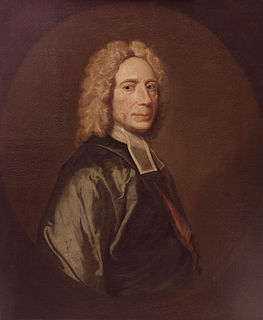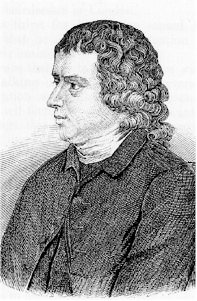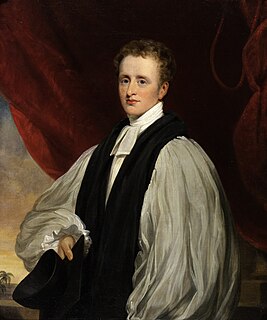Related Research Articles

"And did those feet in ancient time" is a poem by William Blake from the preface to his epic Milton: A Poem in Two Books, one of a collection of writings known as the Prophetic Books. The date of 1804 on the title page is probably when the plates were begun, but the poem was printed c. 1808. Today it is best known as the hymn "Jerusalem", with music written by Sir Hubert Parry in 1916. The famous orchestration was written by Sir Edward Elgar. It is not to be confused with another poem, much longer and larger in scope, but also by Blake, called Jerusalem The Emanation of the Giant Albion.

A hymn is a type of song, usually religious and partially coincident with devotional song, specifically written for the purpose of adoration or prayer, and typically addressed to a deity or deities, or to a prominent figure or personification. The word hymn derives from Greek ὕμνος (hymnos), which means "a song of praise". A writer of hymns is known as a hymnist. The singing or composition of hymns is called hymnody. Collections of hymns are known as hymnals or hymn books. Hymns may or may not include instrumental accompaniment.

A hymnal or hymnary is a collection of hymns, usually in the form of a book, called a hymnbook. Hymnals are used in congregational singing. A hymnal may contain only hymn texts ; written melodies are extra, and more recently harmony parts have also been provided.

William Billings is regarded as the first American choral composer, and leading member of the First New England School.
"Chester" is a patriotic anthem composed by William Billings and sung during the American Revolutionary War. Billings wrote the first version of the song for his 1770 songbook The New England Psalm Singer, and made improvements for the version in his The Singing Master's Assistant (1778). It is the latter version that is best known today.

The hymn, "When I Survey the Wondrous Cross", was written by Isaac Watts, and published in Hymns and Spiritual Songs in 1707. It is significant for being an innovative departure from the early English hymn style of only using paraphrased biblical texts, although the first couplet of the second verse paraphrases Galatians 6:14a and the second couplet of the fourth verse paraphrases Gal.6:14b. The poetry of "When I survey..." may be seen as English literary baroque.

Isaac Watts was an English Congregational minister, hymn writer, theologian, and logician. He was a prolific and popular hymn writer and is credited with some 750 hymns. His works include "When I Survey the Wondrous Cross", "Joy to the World", and "Our God, Our Help in Ages Past". He is recognized as the "Godfather of English Hymnody"; many of his hymns remain in use today and have been translated into numerous languages.

"Love Divine, All Loves Excelling" is a Christian hymn by Charles Wesley on Christian perfection. Judging by general repute, it is among Wesley's finest: "justly famous and beloved, better known than almost any other hymn of Charles Wesley." Judging by its distribution, it is also among his most successful: by the end of the 19th century, it is found in 15 of the 17 hymn books consulted by the authors of Lyric Studies. On a larger scale, it is found almost universally in general collections of the past century, including not only Methodist and Anglican hymn books and commercial and ecumenical collections, but also hymnals published by Reformed, Presbyterian, Baptist, Brethren, Seventh-day Adventist, Lutheran, Congregationalist, Pentecostal, and Roman Catholic traditions, among others including the Churches of Christ. Specifically, it appears in 1,328 of the North American hymnals indexed by the online Dictionary of North American Hymnology, comparable to Newton's "Amazing Grace" (1,036), Wesley's "O for a Thousand Tongues" (1,249), and Watts' "When I Survey the Wondrous Cross" (1,483), though still well short of Toplady's "Rock of Ages" (2,139) or Wesley's own "Jesu, Lover of my Soul" (2,164).
"Joy to the World" is an English Christmas carol. Written in 1719 by the English minister and hymnwriter Isaac Watts, the carol's lyrics are based on a Christian interpretation of Psalm 98, Psalm 96, and chapter 3 of the Book of Genesis. The carol is usually sung to an 1848 arrangement by the American composer Lowell Mason.
"Africa" is an 18th-century hymn tune by American choral composer William Billings, who worked in New England.
The fuguing tune is a variety of Anglo-American vernacular choral music. It first flourished in the mid-18th century and continues to be composed today.

"O sanctissima" is a Roman Catholic hymn in Latin, seeking the prayers of the Blessed Virgin Mary, and often sung in various languages on her feast days. The earliest known publication was from London in 1792, presenting it as a traditional song from Sicily; but no original source or date has been confirmed for the simple melody or the poetic text. The tune is often called "Sicilian Mariners Hymn" or similar titles, referring to the seafarers' nightly invocation of Mary as their maternal protector: Our Lady, Star of the Sea. The tune has been notably reused for the German Christmas carol "O du fröhliche", the English recessional hymn "Lord, Dismiss Us With Thy Blessing", and the first half of the American civil rights anthem "We Shall Overcome".

"O Sacred Head, Now Wounded" is a Christian Passion hymn based on a Latin text written during the Middle Ages. Paul Gerhardt wrote a German version which is known by its incipit, "O Haupt voll Blut und Wunden".

"Come Thou Fount of Every Blessing" is a Christian hymn written by the pastor and hymnodist Robert Robinson, who penned the words in the year 1758 at the age of 22.

"Holy, Holy, Holy! Lord God Almighty!" is a Christian hymn written by the Anglican bishop Reginald Heber (1783–1826).
The Sacred Harp is a shape note tunebook, originally compiled in 1844 by Benjamin Franklin White and Elisha J. King in Georgia and used to this day in revised form by Sacred Harp singers throughout America and overseas. This article is a historical overview and listing of the composers and poets who wrote the songs and texts of The Sacred Harp.

Katherine Kennicott Davis was an American composer, pianist, arranger, and teacher, whose most well-known composition is the Christmas song “Carol of the Drum,” later known as "The Little Drummer Boy".

"Our God, Our Help in Ages Past" is a hymn by Isaac Watts in 1708 that paraphrases the 90th Psalm of the Book of Psalms. It originally consisted of nine stanzas; however, in present usage the fourth, sixth, and eighth stanzas are commonly omitted to leave a total of six. In 1738, John Wesley in his hymnal, Psalms and Hymns, changed the first line of the text from "Our God" to "O God". Both Watts' wording and Wesley's rewording remain in current use.

The alma mater of the University of Pittsburgh was adopted soon after the University changed its name in 1908 from the Western University of Pennsylvania to its current moniker. Lyrics were written by George M. P. Baird, class of 1909 and were set to the tune of what was then the Austrian National Anthem. A new tune for the "Alma Mater" hymn was composed by Charles W. Scovel, class of 1883, but it was not widely adopted and was either lost or became obscure.

"Ye Choirs of New Jerusalem" or "Sing, Choirs of New Jerusalem" is an English Easter hymn by Robert Campbell. It is a 19th-century translation of the medieval Chorus novae Ierusalem, attributed to Fulbert of Chartres. The text's primary focus is the Resurrection of Jesus, taking the theme of Jesus as triumphant victor over death and deliverer of the prisoners from Hell.
References
- ↑ Edward B. Davis, "Robert Boyle as the Source of an Isaac Watts Text set for a William Billings Anthem," The Hymn: A Journal of Congregational Song, 53 (2002), 46-7